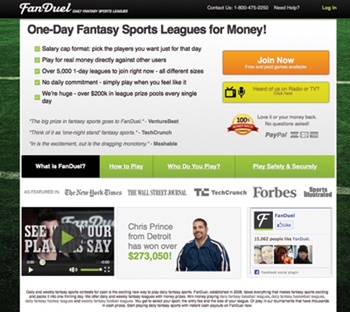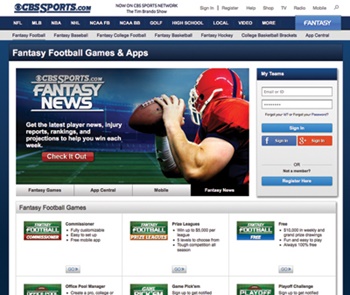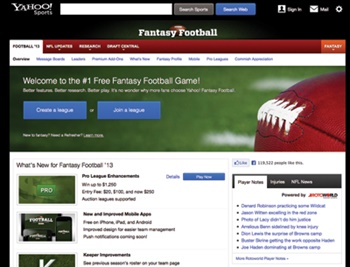With the NFL season just around the corner, NFL fans are not just tracking their favorite team’s progress through the preseason; they are also gearing up for fantasy football drafts. And while the online game has quickly become a national pastime, questions surrounding its legality have recently emerged. Gambling associations have been linked with fantasy sports since the 1950s, but the conversation has intensified as participation in daily fantasy leagues has skyrocketed. Sports performance, after all, is highly unpredictable, and league winners are traditionally compensated via league entry fees. Therefore, on the surface it is easy to see how and why the gambling associations were derived, but upon closer examination, are they deserved?
Over the past two decades, legal commentators have examined gambling’s role within the activity and compiled a long list of comparisons and contrasts. Some commentators have equated fantasy sports to gambling’s cousin, stock speculation, as there is initial investment, research required to succeed and the potential to earn money. Others have observed notable differences such as yearly payouts and the lack of a variable point spread.
In 2006, Congress passed the Unlawful Internet Gambling Enforcement Act, which restricted people’s ability to place wagers on the Internet. Fantasy sports were granted an exemption to this law. The NFL was actively involved in this process, and the immunity has helped fuel the multibillion-dollar industry. This in turn has raised the stakes of the sports betting debate. The questions surrounding this relationship have clouded an otherwise bright future for the lucrative activity.
Most studies about fantasy sports lacked the firm underpinning of primary research from fantasy sports participants. Over the past six years, we have conducted a number of fantasy sports studies. The premise for each has varied, but our intent has remained the same: to investigate the orientations and actions of fantasy sports participants from a behavioral perspective.
Perhaps the findings could shed some light on the questions that still linger for fantasy sports.
One study, in particular, examined the motives to play fantasy football. Financial gain was identified as a reliable motive for a small percentage of participants. However, those who indicated the strongest urge to win money spent less time engaged with their respective fantasy team and consumed less professional football. These findings contradict the sports gambling research that supports a strong positive relationship between
the quest for financial gain and fanatical sports consumption.
We have also studied unhealthy behaviors associated with fantasy sports participation. Gambling research identifies financial loss and an increase in social ills, such as isolation, depression and anxiety as substantial negative consequences of sports betting. However, in our comparison of those who pay to play fantasy baseball and those who do not, it was determined that those who provide the initial investment (league entry fee) showed a stronger desire to interact socially with friends, family and co-workers through fantasy sports. In addition, the average entry fee of the participants within this study was $135. Over the span of a six-month MLB season, this equates to about $4.50 per week, or 83 cents per MLB game. Another study found the connection to a favorite team, not the amount of money invested, was the most impactful predictor of fantasy involvement.
Around the same time fantasy sports was provided an exemption to the 2006 law, Charles Humphrey, an individual who had never actually played fantasy sports, unsuccessfully filed a complaint in New Jersey that argued pay-to-play fantasy sports leagues should be considered a form of illegal Internet gambling. The critical point in this debate is whether fantasy sports are considered games of luck or skill. Those who consider fantasy sports to be a gambling activity contend that it is a game of luck, similar to online poker, which was not provided an exemption in the 2006 law. The perception of this relationship is vital to the legal future of fantasy sports.
Several of our studies have measured the participants’ perception of skill and luck relationship, and despite a mix of several diverse samples and various activities, the results have been fairly consistent. First, the stronger one’s connection with fantasy sports, monetarily or not, the more perceived skill is required. Second, even the less committed participants still believed more skill than luck was involved. Thus, it appears fantasy participants of all kinds believe that the activity is based more on skill and less on luck, and taken together, our research suggests the firsthand assessment of the tie between gambling and fantasy sports is currently incongruent.
 |
However, the future of fantasy sport remains a bit murky as the recent growth of daily leagues, such as FanDuel.com, has potentially shifted the landscape. The opportunity for an individual to wager on the daily performance of professional athletes could substantially increase the luck components of fantasy competition. Suddenly, weather, an injury or even an odd bounce of the ball could spell some serious financial outcomes for the daily participant. More importantly, the current legislation that protects fantasy sports was not devised to accommodate this distinct change in format. Technology, innovation and an ambitious marketplace continue to create new and exciting games that are years ahead of the legislative process.
At some point, one would think lawmakers will revisit the legislation. If a legal challenge was lobbed, the onus would be on daily leagues to show the skill-to-luck ratio remains heavily in favor of the skilled participant. How involved do professional leagues become in the lobbying process? More research in this area is needed. The stage is set for an intriguing, yet crucial, debate for the fantasy sports industry, and current research suggests the odds are with the industry.
Brendan Dwyer (bdwyer@vcu.edu) is assistant professor at the Center for Sport Leadership at Virginia Commonwealth University. Joris Drayer (jdrayer@temple.edu) is associate professor of sport and recreation management at Temple University.







